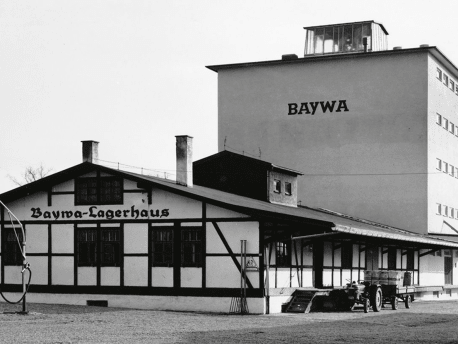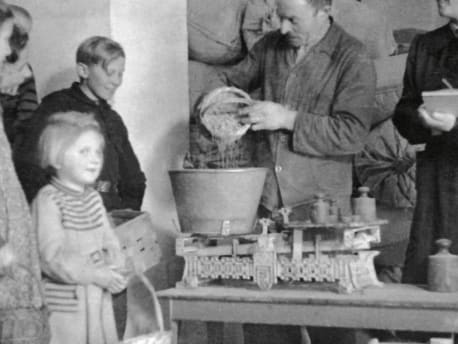
The war and a new beginning

Under the regime’s control
The start of the decade was shaped by a German economy in tatters and the rise of the Nazi Party. According to the company’s 10th annual report, “the value of German agricultural production sank” in light of “the unusually steep fall in prices” and “farmers are watching the basis of their wealth disappear”.
The Nazis’ rise to power brought with it drastic changes. From 1933, the Reichsnährstandsgesetz and the Reichserbhofgesetz (land heritage law or the State Hereditary Farm Law of 1933) created the Gleichschaltung of all agricultural operations and government control of production, sales and prices.
These laws and the resulting nazification of all agricultural operations had one clear goal: an independent national food supply and securing the Nazi regime.

The Nazis’ agricultural policies prepare the country for war
BayWa was also under the regime’s control. BayWa commented on the Reichsnährstandsgesetz with the words: “Just distribution without considering opportunities to make money.” A campaign was started to convince farmers of the beneficial effects of chemical fertilisers on production. But, although government intervention kept prices low, consumers still had to pay for the ideologically motivated isolation from global market through food prices that were often too high. The policies referred to as the Ernährungsschlacht, or battle to feed the nation, were ultimately a part of the regime’s preparations for war.

The sad price of the war
The German Instrument of Surrender ended WWII on 8 May 1945. The food industry suffered a complete breakdown. Only with the help of the occupying forces was it possible to close the most serious gaps.
By the end of the war, 512 BayWa employees had been killed in action, and 487 were still missing. To make matters worse, many warehouses and offices had been completely or partially destroyed.
Denazification and a new beginning
In keeping with the US military government’s orders, all Board of Management and Supervisory Board members were forced to resign. As part of the denazification process, 26 departmental heads and authorised representatives at the company’s headquarters and branches were dismissed along with 131 warehouse managers. Additionally, a number of employees were relieved of their previous duties for political reasons. Dr Josef Singer, a politically non-incriminated person, was appointed to head of the company’s management.
Very early on, the American military government recognised BayWa’s significant role in agricultural production. It quickly granted permits for the company to resume its business operations and transport goods overland.
Despite the extremely difficult conditions, BayWa gained the approval of the military authorities and turned its attention to helping secure the food supply as best as it could. This meant a new beginning for BayWa and its employees in 1945.